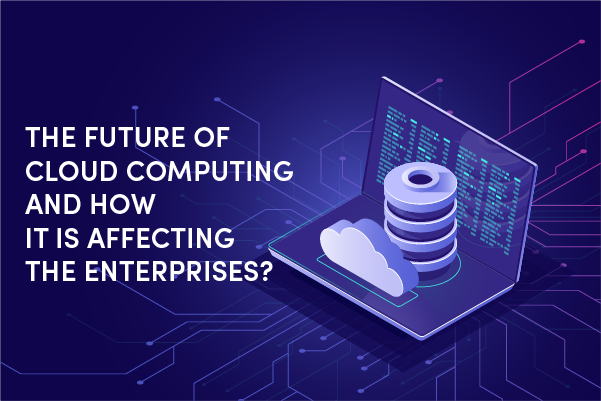Companies are successfully using the benefits of cloud technology to help their business grow. During the covid crisis, businesses moved their services online, thus the need to increase storage capacity, have a modernized software technology, and take security measures made them adapt to cloud technology even for long-term goals.
How cloud computing is affecting enterprises’ future and how crucial it will be the need to use this technology, will be described in this article, as well as the impact it is making on the economy worldwide.
In addition to saving significant IT infrastructure costs, cloud computing allows organizations to access computing resources via the internet. By using this technology, you can access scalable and secure computing resources without having to install physical servers in your office or have a server room on your premises. With the increasing demand for cloud-based services, our choice of cloud-based software and platforms will continue to grow.
The cloud computing revolution has created hybrid working models through cloud collaboration platforms and Infrastructure-as-a-Service (IaaS). An organization can either run its IT infrastructure in the cloud or implement a cloud-based solution designed to target specific operations. With either approach, customers pay for resources as they use them – usually on a subscription basis or pay-per-use – ensuring flexibility without wasting resources.
Cloud computing trends illustrate how business operations, IT budgets, and technology have evolved. The public cloud avoids the need to purchase and maintain on-site infrastructure, manage IT upgrades, and spend time and money on IT specialists. It is entirely the responsibility of the cloud vendor to maintain and support the infrastructure and underlying software in cloud computing. Businesses should focus only on what they do.
What cloud computing is improving for enterprises
When moving online, all of the data needs to be stored in data centers. This can be expensive to some companies that don’t necessarily need to have such physical data storage of their own. Most companies use a cloud provider to offer such services. With the high number of cloud providers in the market, any business can profit from the concurrency and competitive prices they offer. Meaning, that as a client, you can expect lower prices from cloud providers.
Cloud computing technologies will ultimately require advanced system thinking as individual programs become more sophisticat/ed and large. In today’s world, most system software requires extensive customization, which means that cloud computing solutions used by businesses also require extensive customization to function and be secure.
Users must be able to easily use and customize this new program.
Software development can be viewed from different perspectives and approaches since future applications won’t be stored in the cloud. In addition to modules, cloud service servers can also be incorporated into the system. Software and storage costs can also be reduced this way.
Therefore, time and money will be saved by using these software solutions in the long run, because they are considerably faster and more agile.
Various services are offered by cloud computing. Platform-as-a-service (PaaS), software-as-a-service (SaaS) and infrastructure-as-a-service (IaaS) are the main ones.
Providing these services is critical to achieving business goals. Over 60% of all work will be handled by SaaS solutions soon, according to many studies and assessments.
Current cloud server security provides some but not complete protection. Several of the safeguards that are required for effective data protection may not be available to smaller cloud service providers.
Cyberattacks can be prevented by implementing better cybersecurity safeguards and enforcing safer practices in future cloud services. Due to this, businesses won’t have to worry about data security or other storage methods and can focus on more important tasks.
The economic impact of cloud computing
Cloud computing will minimize the demand for hardware if it evolves at its current rate or faster. The majority of operations and business processes will be virtualized, cloud-based, or run on virtual machines (VMs). Consequently, set-up costs for physical infrastructure and software installations will be greatly reduced, which will result in lower hardware utility.
The ability to access files in the cloud from anywhere in the world has made cloud computing so popular among businesses.
In 2022, Gartner‘s research makes some interesting predictions regarding cloud computing. In 2020, global cloud services spending reached $313 billion, but researchers project it to increase to $482 billion this year. In almost every digital service delivery model, cloud infrastructure is the backbone, including social media, streaming, and the internet of things (IoT).
Through cloud technology, other technological developments and innovations will become faster, more accessible, and more secure for end-users. Increasingly, businesses are migrating to the cloud because of that reason.
Physical infrastructure will soon fail to support businesses. All innovations will rely on cloud technology because of its ease of use and adaptability. This is why your business needs to make this shift as cloud computing is gaining popularity in all kinds of industries.
Conclusion
Cloud migration is becoming increasingly popular as more organizations take advantage of the increasing benefits offered by the cloud. As a result, businesses are seeking more efficient ways to transfer years of workloads and data.
With Accrets, you can migrate seamlessly, quickly, and – most importantly – securely. Maintaining up-to-date technology trends is crucial, as well as migrating your workloads and sensitive data to the cloud as quickly, easily, and as securely as possible.
Our IT Services can extend to helping you manage your cloud environment in the following areas:
- Virtual Machine and Operating System
System installation, patching, upgrades, security, system administration, Active Directory, system monitoring
- Database and Application
Database administration, patching, upgrades, SAP Basis Support, Microsoft Exchange Management, Web Services
- Service Incident Resolution
Prompt response to service outages and quick execution to restore services
- Service Reporting
Standard service reports to give you visibility into how your cloud environment is performing and the resource utilization.

